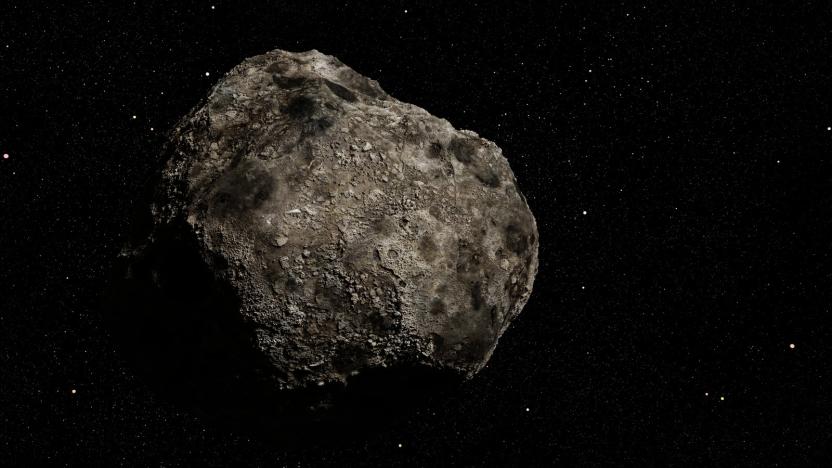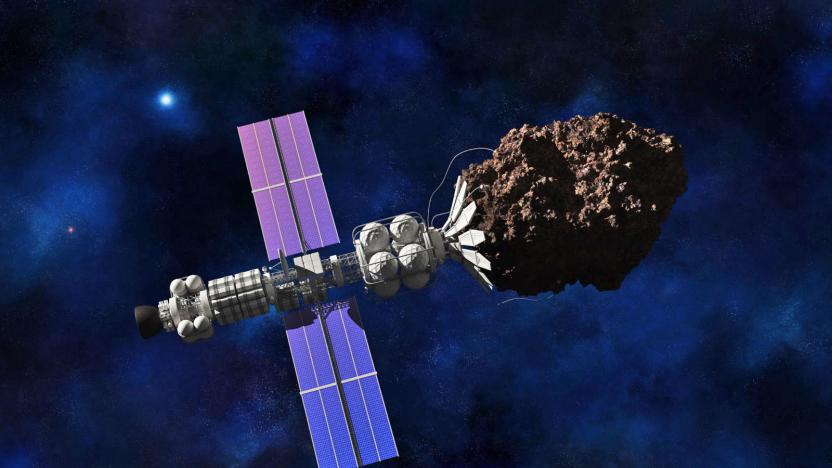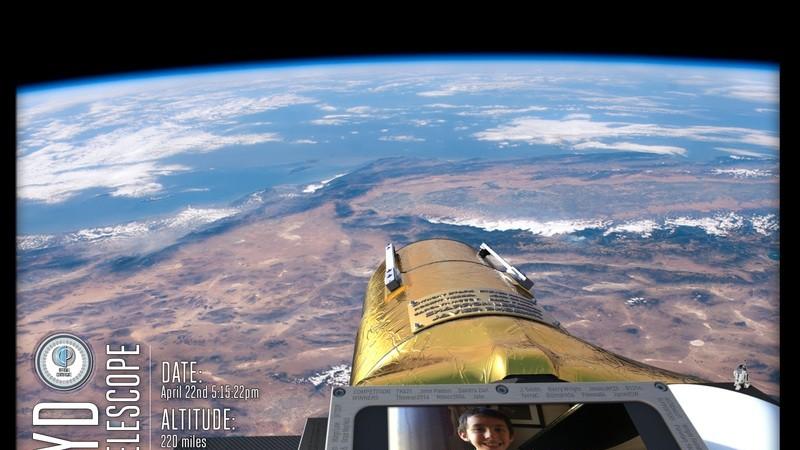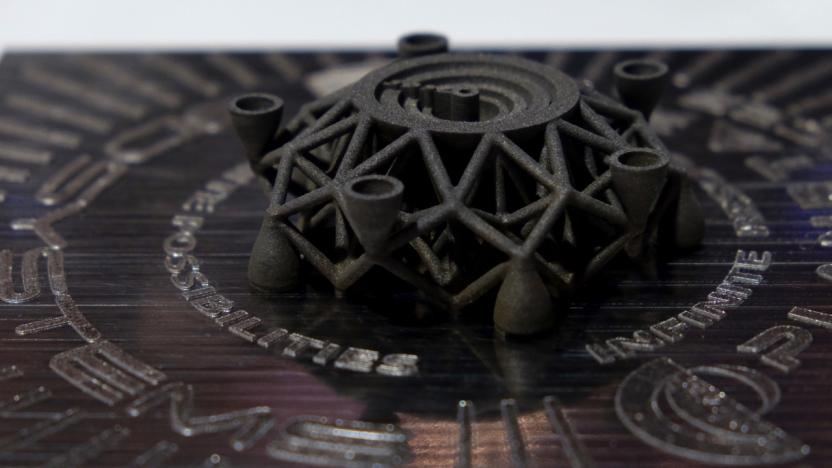planetaryresources
Latest

Blockchain company buys asteroid mining firm Planetary Resources
Planetary Resources just took an unusual turn on its path to asteroid mining. ConsenSys, a blockchain company created by Ethereum co-founder Joe Lubin, has bought Planetary Resources for an unspecified sum. It sounds supremely trendy given the combination of blockchain and private spaceflight, but it's a logical fit if you ask Planetary Resources' Brian Israel. Blockchain-based smart contracts represent a "natural solution" for commerce in space, Israel said -- there are no territorial divisions, so this may be an ideal way for people from various countries to "coordinate and transact."

Space mining gets a boost through Luxembourg's new law
American asteroid mining companies are allowed to keep their hauls, but what about European outfits? They should be set from now on. Luxembourg (which already has its own space mining tech) has adopted a draft law that gives private operations the right to keep what they take from asteroids and other near Earth objects, so long as they get authorization for their mission and obey international law. This doesn't let anyone lay claim to spaceborne entities, the country says -- it just eliminates the uncertainty when that material arrives on the ground. The law should take effect sometime in early 2017.

Planetary Resources cancels 'space selfie' project
Sad news for fans of space exploration and pictures of themselves today: asteroid mining company Planetary Resources has decided to cancel its plans to launch an Arkyd 100 space telescope that would have allowed users on earth to take a "selfie" of sorts with the satellite. The project racked up $1.5 million during a Kickstarter campaign in 2013, but it wasn't enough to get the project off the ground. While they won't be getting a photo of themselves from space, the 17,000-plus backers will at least be getting their money back.

Luxembourg's spacecraft will test its asteroid mining tech
Luxembourg is pouring some of its wealth into the development and launch of a spacecraft that could make it even richer. The tiny European country has teamed up with California-based Deep Space Industries to create Prospector-X, an experimental spacecraft designed to test some of their asteroid-mining technologies.

Inhabitat Week in Green: All the EVs at CES, and more!
Want to see the future of transportation? Look to CES 2016, where innovators debuted the state of the art in high-tech mobility. Chevrolet kicked things off by launching the first electric car for the masses, the 2017 Bolt EV. It gets 200 miles per charge and will cost around $30,000. (Check out our interview with GM engineering chief Pam Fletcher here.) Meanwhile, the mysterious startup Faraday Future showcased an insane 1,000-horsepower electric vehicle that looks like a rocket ship and Ehang showcased an autonomous helicopter that can carry you up to 11,000 feet without a pilot. And a Chinese "hoverboard" company made the news when federal marshals raided their booth over copyright concerns.

Here's what you missed on day four at CES
#fivemin-widget-blogsmith-image-913972{display:none;} .cke_show_borders #fivemin-widget-blogsmith-image-913972, #postcontentcontainer #fivemin-widget-blogsmith-image-913972{width:100%;display:block;} try{document.getElementById("fivemin-widget-blogsmith-image-913972").style.display="none";}catch(e){} Day four of CES 2016 was less about consumer products, and more about pie-in-the sky ideas. A company that one day plans to mine asteroids 3D-printed an object out of asteroid dust, just to show how humans might build objects on remote planets. We also got our first look at the KATIA robot arm, a surprisingly affordable device that could help you do light manufacturing or, say, build Lego. Finally, we got a look at two smartphones that use Google's vaunted Project Tango tech that will let you 3D scan all the things. For those and the other stories, watch our Editor-in-Chief Michael Gorman's take on the day (above) or check the gallery below.

This is the first object 3D-printed from alien metal
So-called "asteroid mining" company Planetary Resources is built on the belief that asteroids and other objects in space are loaded with resources that we can take advantage of, both here on Earth and as we begin to explore space in earnest. The essentially infinite supply of rocks floating through space, filled with valuable minerals that we'll eventually run out of on our home planet, sounds like a great resource to take advantage of. But the idea of mining, processing and building with alien metals also sounds like a massive and daunting undertaking.

Larry Page's asteroid-mining firm launches its first satellite in July
Planetary Resources hasn't had much success getting its asteroid-mining business off the ground, in a very literal sense -- it lost its first satellite, Arkyd-3, in the Antares rocket explosion last year. It's about to get a second try, though. The Larry Page-backed company has announced that its craft's follow-up, Arkyd 3 Reflight (aka Arkyd 3R), is scheduled to launch from the International Space Station in July. While the vehicle will spend just 90 days sending self-diagnostic info before it falls to Earth, it'll serve as a useful test run before the more ambitious Arkyd 6 starts wielding its scientific instruments in December. No, this isn't the long-promised space telescope, but it's an important early step.

NASA wants your help hunting for asteroids
"Asteroid hunters." It sounds like some Hollywood blockbuster / straight-to-DVD "classic" that already exists, but now you, yes you, can be one... from your PC. NASA has launched a desktop app that recruits civilians to help identify asteroids from telescope photography, helped by a special asteroid algorithm. Scientists announced the desktop app at SXSW during in a panel discussion where they elaborated on how muggles citizen scientists were helping their efforts to identify and tag asteroids. The app is another collaboration between NASA and Planetary Resources. (It's apparently all under a Space Act agreement, which is the coolest act we've heard of in a while.)

Planetary Resources wants your help spotting asteroids
Eager to help Planetary Resources look for asteroids and bring humanity that much closer to space mining? Well, it's time to get cracking. The company has launched Asteroid Zoo, a site that relies on crowdsourcing (i.e. you) to both find rocks in the void and train computers to do the same. It's pretty straightforward -- all you do is look at image sets from the Catalina Sky Survey and mark any asteroids or artifacts.

Planetary Resources and NASA team up to crowdsource the search for asteroids
Planetary Resources really wants to mine asteroids for valuable materials, but first it has to find them. So the company is partnering with NASA on a crowdsourcing project that would put the American public to work identifying and tracking near-Earth-objects (NEOs). All the data generated will be open sourced and made publicly available on the web. The effort will center on a series of challenges and contests designed to lure in citizen scientists and the results will be reviewed by Planetary Resources. Obviously, the company will be looking for mineable hunks of space rock, but it will also be giving back to the scientific community by using the data it collects to improve algorithms for detecting asteroids. And, obviously, the more of those we're able to detect and track, the less likely we are to be caught off guard by a meteorite apocalypse. To be notified when the program kicks off, sign up for more info at the Planetary Resources site.

Don't miss LeVar Burton, Ben Heck, Adafruit and Planetary Resources at Expand NY!
We're getting more and more excited watching the Expand NY agenda come together. We've already announced our first set of speakers (by which we mean people on stage, not those kind of speakers) including legendary game designer Peter Molyneux, Pebble CEO Eric Migicovsky, io9 editor-in-chief Annalee Newitz and the man responsible for clogging the Internet's tubes with funny cats: Ben Huh. But wait, there's more! Joining us at Javits Center this November will be: LeVar Burton, Actor, Director, Educator, co-founder of RRKidz Chris Lewicki, President and Chief Engineer, Planetary Resources, Inc. Becky Stern, Director of Wearable Electronics, Adafruit Industries Ben Heck, Master Modder on element14's The Ben Heck Show

ARKYD space telescope reaches its funding goal, new add-ons await (video)
And communal space astronomy is go. Planetary Resources has successfully hit the $1 million crowdfunding target for its ARKYD telescope, which should now be on track for its promised 2015 launch. The project has also racked up 11,000 backers, and that means a new round of add-ons for the extra-committed. Backers can buy a special mission patch ($7), additional selfie photos (from $25) and even a half-size ARKYD replica ($650). There are a few more pragmatic reasons to invest, of course -- the company has stretch goals that could bring a second ground station, selfies during the beta phase and even hunts for undiscovered planets. Would-be researchers who still want to pitch in can visit Kickstarter by June 30th.

Insert Coin: Planetary Resources ARKYD space telescope will take your selfies from space in 2015
In Insert Coin, we look at an exciting new tech project that requires funding before it can hit production. If you'd like to pitch a project, please send us a tip with "Insert Coin" as the subject line. We've seen the Arkyd 100 telescope before, Planetary Resources' impressively small asteroid-hunting machine that offers performance matching any on-earth scope (yes, even the really big ones on the tops of mountains) in a package that's about the size of a quarter keg of beer. Its length of 425mm fully deployed (16.7 inches) is absolutely dwarfed by Earth's current great orbital scope: the Hubble Space Telescope, which is 13.2 meters (or 43 feet) long. The space shuttle cargo bay could carry a single Hubble into orbit. If it were still operating, it could take a thousand Arkyd 100 scopes in a single shot. But, of course, it isn't still operating, which is perhaps partly why Planetary Resources is looking for $1 million in earthly support. The extra-orbital mining company has turned to Kickstarter to raise a little early funding and to help get its first fully functional Arkyd 100 scope into orbit. If you jump in early, you can get your face in orbit too -- well, a picture of it anyway. More details after the break.%Gallery-189607%

Planetary Resources co-founder Peter Diamandis on bringing space exploration to the masses
Picture an optical telescope, a really good optical telescope, and you have to think big. The most powerful consumer-grade models often stand taller than their operators. The grand, institutionally owned ones are hidden beneath giant domes above the clouds on mountaintops. The world's best, the Hubble Space Telescope, is as big as a school bus and sits out in orbit, while its successor, the James Webb Space Telescope, will be roughly the size of a Boeing 737. What, then, could a telescope smaller than a trash can possibly do? Quite a lot, as it turns out -- if you can get it outside of the Earth's pesky atmosphere, that is. Planetary Resources plans to take rocks floating aimlessly in the solar system and turn them into valuable commodities. But, before we get there, the company hopes to revolutionize space exploration in the same way that 3D printing and microfunding have revolutionized manufacturing. Planetary Resources co-founder and co-chairman Peter Diamandis chatted with us, telling us why the company made the unusual decision to put its first orbital optical telescope up for grabs on Kickstarter.

Planetary Resources shows off Arkyd-100 prototype, gives a tour of its workspace
We last heard about Planetary Resources back in April of last year, when the team formally announced plans to mine asteroids for things like water and precious metals like platinum. Chris Lewicki, who sports the unspeakably cool title of president and chief asteroid miner, assures us all that his team has been very hard at work in the interim. While he's not quite ready to show everything off just yet (due, in part, to intellectual property concerns), the space executive gave the internet a glimpse of the Arkyd-100 mechanical prototype, a space telescope and technology demonstrator packed into a dense 11 kilograms. In the below video, Lewicki give a quick walk around the lightweight, low-cost prototype. There's also a glimpse of the of the company's Class 10,000 clean room and Arkyd-100 manufacturing facility.

Planetary Resources reveals plan for prospecting asteroids, creating interstellar gas stations
The cat got let out of the bag a little early, but Planetary Resources has now officially announced its existence and mission. We already told you that the venture plans to mine asteroids for profit, and is backed by a bunch of bigwigs from Silicon Valley and Hollywood. But now we know a bit more about the company after watching its announcement webcast and speaking with co-founder Peter Diamandis. Turns out, the company sees itself not only as a business venture, but as an entity that will pave the way for extending human influence throughout the solar system. Read on after the break for more.

James Cameron-backed Planetary Resources to search the universe for Unobtainium
Planetary Resources will reportedly announce later today that it's developing and selling low-cost spacecraft to mine asteroids close to the Earth. The space exploration and natural resources venture is led by X-Prize creator Peter Diamandis, Eric Anderson and NASA's former Mars chief, Chris Lewicki -- with cash backing from James Cameron, Eric Schmidt and Larry Page amongst others. Within a decade, the company hopes to kickstart a 21st century gold rush by selling orbiting observation platforms to prospectors with significant rewards -- a 30-meter long asteroid could hold as much as $50 billion worth of platinum at today's prices. The company's own teaser materials promised that the project would add "trillions of dollars" to the world's GDP, which sounds like a film we saw recently.










